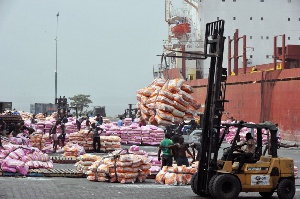Government is constructing 80 warehouses with the capacity to store up to 80,000 metric tonnes (MT) of food items, as part of deliberate steps to ensure that there is food security in the country.
Each warehouse would have the capacity to store 1,000 MT and is expected to be ready by June, this year.
Speaking at a media briefing to update the public on the country's food security situation, Dr. Owusu Afriyie Akoto, the Minister of Food and Agriculture said in all, they had targeted building warehouses with a combined capacity to store 200,000 metric tonnes.
Government would distribute the management of the 80 warehouses upon completion, to the National Food Buffer Stock Company (NAFCO), Ghana Stock Exchange, private sector organizations and the sector Ministry for efficient operation.
Dr. Afriyie Akoto said since the COVID-19 outbreak in the country, the Ministry had been engaging input distributors, importers, development partners and Ghana Commodity Exchange to craft remedial measures to respond to the pandemic.
Available funding had been made to the NAFCO to mop up strategic food stocks to make sure that there was no threat to food security, and to also provide regular update on the food situation.
The Minister gave the assurance that the nation had adequate food stock to meet the needs of Ghanaians due to the implementation of the Planting for Food and Jobs and other modules like Planting for Export and Rural Development and Rearing for Food and Jobs.
He said 650,000 metric tonnes of rice and three million metric tonnes of maize, were produced last year. The country also exported 19 different food items to the West African Sub-region.
He underlined the need to ramp up credit facility to players in the agriculture value chain to increase production and sustain their businesses.
Dr Afriyie Akoto refuted claims that prices of food items were still high even after the lifting of the three-week partial lockdown.
He acknowledged that there were slight increases in the price of food items moments before the lockdown in parts of Accra and Greater Kumasi, due to panic buying, but said the prices had since the lifting of the restriction of movements returned to normal.
Meanwhile, the International Fund for Agricultural Development (IFAD) has made available $20 million to Ghana Government to support agriculture expansion programmme following the COVID-19 pandemic.
Business News of Wednesday, 29 April 2020
Source: GNA













